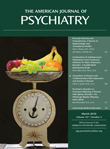To the Editor: The influenza A (H1N1) virus is currently a pandemic, and there is fear about further spread of this infection around the world. The antiviral drug oseltamivir is regarded as an effective treatment of influenza infection (
1), with increasing use globally. However, there have been reports of neuropsychiatric events associated with the drug, mainly in Japan. We present a case of mania associated with the use of oseltamivir in a Chinese patient.
"Miss L" was an 18-year-old woman with good physical health and no personal history of psychiatric illness but a family history of bipolar affective disorder. She developed upper respiratory symptoms for 1 day, followed by a fever of 39.4°C. She was confirmed to have the influenza A virus, subtype H1N1, infection by reverse transcription-polymerase chain reaction and a viral culture of nasopharyngeal swab. The patient was prescribed oseltamivir, 75 mg twice daily, for 5 days. After the first day of treatment, she presented with elated mood, irritability, inflated self-esteem, increased talkativeness with pressure of speech, flight of ideas, and decreased need for sleep. She had delusions of "special power," and her clinical picture was compatible with mania. Blood tests and a computed tomography scan of the brain were normal. The patient did not use alcohol or illicit drugs. A urine toxicology screen was negative, and there was no clinical evidence of encephalopathy. She completed a 5-day course of oseltamivir treatment. Her manic symptoms did not subside until after 30 days of discontinuation of the drug, despite treatment with valproate, 500 mg twice daily, and risperidone, 3 mg twice daily. Because of the close temporal relationship between oseltamivir treatment and the development of manic symptoms, with no other plausible causes for neuropsychiatric manifestations, oseltamivir-induced mania was the likely diagnosis.
To our knowledge, this is the first reported case of an oseltamivir-related neuropsychiatric event in Hong Kong. The majority of the neuropsychiatric events related to the use of oseltamivir were reported in Japan, with cases of suicide as well (
2). However, a retrospective review supported by claims-based neuropsychiatric events in the United States did not show an increased risk of neuropsychiatric episodes in patients treated with oseltamivir relative to comparison subjects (
3). The Chinese population has a close genetic linkage to the Japanese population, and the observation of neuropsychiatric events in Japanese patients treated with oseltamivir may be relevant to individuals of Chinese ancestry. Since the prescribing of oseltamivir has become more widespread, we recommend that clinicians be mindful about this potential side effect and carry out vigilant monitoring of each patient's mental state, especially in those with a family or personal history of mental illness.

